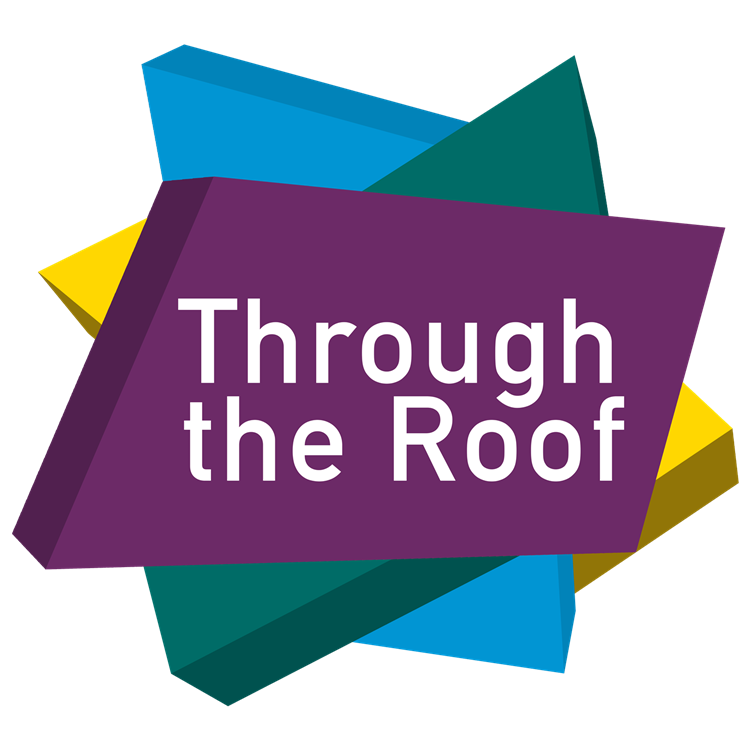Tears of Joy: Our Spring 2016 Vital Link Newsletter
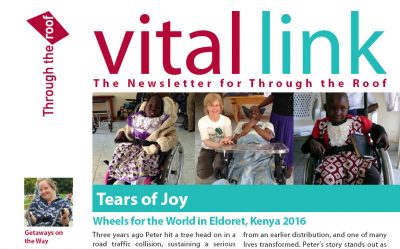
The spring 2016 Vital Link Newsletter is now available for download - this issue contains stories from our trips to Ghana and Kenya, as well as the family holiday to Dalesdown, and much more. Take a look! Please note that an order form for TTR's resources and other products is included at the end of this PDF download
- The Spring 2016 Vital Link (and Order Form) - right-click and save the file
Please get in touch (on 01372 749955 or by following this link to email us) if you have any problems downloading this, or if you’d like to receive future newsletters by post or email.
Opportunity for Churches: Reaching the Most Unreached People
90% – 95% of the world’s disabled people die without ever hearing the Gospel, according to the Lausanne Committee for World Evangelization. Disabled people are one of the world’s most unreached people groups. Christian disability charity Through the Roof would like to partner with churches to change that and is inviting UK churches to participate in a new survey into churches’ experience of their disabled members.
Training Resources Developer Ros Dakin explains, “We want to hear from churches about all the creative ways in which they are engaging with the disabled members of their communities, and also any questions they have about how they can serve disabled people in the spirit of Luke 14, the Scripture in which Jesus reminds us that without disabled people His house is not full.”
You do not have to be a church minister to take part in this survey; Through the Roof would love to hear from both ministers and church members who can submit answers to the following four questions:
- What one thing do you want to know about disability?
- What is the biggest insight you have received from disabled people and their families about the Christian journey of faith?
- How are disabled people in your church exercising their gifts to build God's kingdom?
- Do you have an example of your provision for disabled people that could encourage other churches?
(please use the following to shape your response...
- Name of activity/project
- Why do you do what you do? (your motivation)
- Whom do you serve?
- What do you do?
- How do you do it?
- Where and when does it happen?
Answers can be submitted by email to us, by post to Ros Dakin, Through the Roof, PO Box 353, Epsom, KT18 5WS or by telephoning 01372 737042. You can also reply by posting to our Facebook page, or tweet your replies to us, @TTR_uk. The questions can be supplied in large print or braille on request.
In 2014 Through the Roof carried out a survey into disabled people’s experience of church in the UK. The survey revealed some examples of excellent practice in churches around the country, but also some unfulfilled needs. The two biggest findings were a need among disabled Christians for genuine, reciprocal, fulfilling friendships, and a wealth of spiritual experience and gifting which disabled Christians are longing to share with their sisters and brothers in Christ. The full results of the survey, together with an extensive index of resources to help churches address the issues raised by disabled people, have been published under the title All of Us Complete in Christ, and can be downloaded free from our website.
Briefing on the EU Referendum from a Disability Standpoint (Ros' Blog)

It is a little over a month to the EU referendum, and I suspect I’m not alone in thinking that the standard of content of the debate has been dismally low. There have been ever more extravagant predictions of disaster from both sides. I almost expected the Prime Minister to end his speech the other day, like Private Fraser from Dad’s Army, with a macabre “We’re all dooooooomed”! At the same time, the Leave campaign has portrayed a Britain that remains in the EU as an eviscerated state with no sovereignty, overrun by European migrants, conveniently forgetting that Britons in the EU claim more in benefits than do citizens of other EU countries in Britain.
So how do we find any accurate information, or at least informed opinion? And in particular, how do we know what will be the likely effects on disabled people of leaving or remaining in the EU? And finally, how as Christians should we be praying for the outcome of the referendum?
I have spent some time researching online how disabled people are likely to feel the impact of the result, whichever way it goes. And, as with most aspects of this debate, there is little out there other than biased and largely uninformed speculation. However, among all this some people are making a few good points, although of course none of us can truly predict with any accuracy what the effects will be for the disabled citizens of our nation; only time will really tell.
Through the Roof is a strictly non-political organisation. We have no interest in supporting any particular political party, nor in taking sides in the referendum debate. But we can play a useful role in setting out the salient issues on both sides of the argument which will affect our supporters. To that end, here are some of the better thought out arguments I have come across.
In favour of remaining in the EU
I have found the following facts which are relevant to disabled peoples’ interests, and which would favour remaining in the EU:
- Treatments have been developed through European research for diseases so rare that no one country could have done it alone, highlighting the benefits of being a part of the EU1
- In 2015, 87,000 British disabled people were helped towards employment through training paid for by European Social Funding2
- The EU has implemented measures against forced institutionalisation of disabled people3
- There have been many occasions when European legislation has been ahead of the UK’s or what the UK was prepared to deliver on disability rights4
- British people can currently visit any country within the EU and be guaranteed the same health services at the same cost as a local resident, thanks to the European Health Insurance Card5
And I have found the following reasonably well informed opinions which favour remaining in the EU from a disability standpoint:
- Leaving the EU could undermine the rights of the 10 million people in Britain who are currently living with a disability, since our disability laws are to a large extent based on EU legislation6
- If the economy took a nosedive there could be more austerity cuts7
- Any withdrawal from the European Convention on Human Rights could have a negative impact – successful challenges to the 'bedroom tax' have been based on this8
- Restrictions on the currently unrestricted inward EU migration might mean a time of higher employment in the UK. During times of low employment social care providers can recruit better quality staff but this becomes harder when we are closer to full employment9
- The European Convention on Human Rights proceeded not from the EU but from the Council of Europe, of which we would remain a member even if we were no longer part of the EU. In fact, there are currently 29 European countries which are members of the Council of Europe but not of the EU. So we could still have full participation in Europe and be covered by the ECHR10
- This means that for the time being people could still appeal to the European Court of Human Rights, unless or until a UK government decided to withdraw from it11
- The UK Human Rights Act and Equality Act would be unaffected by leaving the EU unless a UK government decided to introduce new legislation12
- Political Union with Turkey would result in an additional 77 million mainly poorer people having access to EU rights and benefits, putting additional strain on an already stretched benefits system13
- The EU Clinical Trials Directive has caused significant harm, including severe disruption of new drugs trials, which could resume, untrammelled by these regulations14
- The EU is too big and too corrupt to care about helping people out of austerity measures15
- Iain Duncan Smith has said he believes the EU favours the “haves” rather than the “have nots” and that the least advantaged members of society would prosper more outside the EU16
- John Redwood MP claims Brexit would transform spending on the NHS and disability benefits by replacing austerity with prosperity17
- A vote to stay in is not a vote for the status quo. There are undoubtedly new measures waiting to be enacted which will not be revealed until after the referendum for fear of influencing people’s votes. The Five Presidents’ Report18 indicates plans for increased harmonisation between EU states, including on Social Security, and no one knows whether these would strengthen or weaken the rights of the disabled poor19
- http://europa.eu/rapid/press-release_MEMO-14-141_en.htm
- http://www.richardhowittmep.com/index.php/all-news/825-11-03-2016-ten-million-disabled-people-will-lose-if-britain-leaves-the-eu-says-richard-howitt-mep
- http://eur-lex.europa.eu/legal-content/EN/TXT/?uri=CELEX%3A52005DC0604
- Lord Low, quoted in http://www.disabilitynewsservice.com/brexit-would-have-dire-consequences-for-disabled-people/
- http://www.nhs.uk/NHSEngland/Healthcareabroad/EHIC/Pages/about-the-ehic.aspx
- http://www.theguardian.com/social-care-network/2016/mar/11/brexit-could-undermine-the-rights-of-disabled-people
- Deborah King of Disability Politics UK, quoted in http://www.disabilitynewsservice.com/brexit-would-have-dire-consequences-for-disabled-people/
- http://govanlc.blogspot.co.uk/2013/10/european-convention-of-human-rights.html
- https://www.dimensions-uk.org/news-blog-post/disabled-brexit-might-mean/
- http://www.bbc.co.uk/news/uk-politics-32810887
- http://www.telegraph.co.uk/news/newstopics/eureferendum/12175398/EU-Referendum-everything-you-need-to-know-about-British-sovereignty.html
- https://www.equalityhumanrights.com/en/impact-eu-membership-equality-and-human-rights
- http://www.debatingeurope.eu/focus/infobox-arguments-for-and-against-turkeys-eu-membership/#.VzMp2Pbmrcs
- http://www.talkcarswell.com/home/how-eu-membership-killed-off-uk-clinical-trials/2837
- http://globalcomment.com/what-a-possible-brexit-could-mean-for-britains-disabled-people/
- http://www.bbc.co.uk/news/uk-politics-eu-referendum-36252295
- http://www.bbc.co.uk/news/uk-politics-eu-referendum-35873996
- https://ec.europa.eu/priorities/publications/five-presidents-report-completing-europes-economic-and-monetary-union_en
- https://hansard.digiminster.com/commons/2016-05-09/debates/1605098000001/EUReferendumLeaflet
- https://www.churchofengland.org/media-centre/news/2016/04/prayer-for-the-eu-referendum-campaign.aspx
- Luke 19.42
- Luke 12.7
- Matthew 25.31-46
- Matthew 6.10
- 1 Timothy 2. 1-4
- Isaiah 9.7
-
Strategies
- Before reading a chapter in text I gain the gist of it via
- Audio
- Summaries
- I use more than one version for each chapter
- ‘Active reading’
- The following questions, written on a bookmark in my Bible, help me to focus my reading:
- What does this chapter say about God? About people? How should we respond to this chapter?
- 'Overlearning’
-
Recreating Bible content
- I retell a chapter in my own words, as if I am telling it to someone else. I do this repeatedly until I can do it from memory
- I dramatise it, taking the role of one of the characters or acting out the story
- I create a visual presentation of it, for example I draw a timeline, spider diagram or annotated family tree.
- Multi-sensory: print, audio, visual, drama and music
- Interactive:e.g. active reading and recreating Bible content
- Incremental: and repetitious gradually building my learning of each chapter using lots of small steps e.g. exposing myself to the material repeatedly and in different formats
- Flexible:I adapt how many and which strategies I use
- Appropriate for me: I adjust my expectations according to what is realistic and achievable for me e.g. with chapters I find particularly difficult, I limit my objectives by focusing on the one thing that stands out most for me
In Favour of Leaving the EU
I have found the following facts which would favour leaving the EU:
And I have found the following reasonably well informed opinions which favour leaving the EU from a disability standpoint:
How should we pray?
So there you have it. A variety of facts and opinions from both sides of the debate, which we hope will help you to make up your mind. But thankfully, as Christians, we are not reliant on our own ability to work out what we think is best. We have a source of wisdom in the person of the Holy Spirit indwelling us, and we can trust Him to guide us as we make our decision prayerfully. What should we pray for? The Church of England has published a prayer to help us focus our intercession on the things which should matter most to us20, and this is a good place to start.
The debate among politicians and in the media has mainly been focused around the issues of economic prosperity and national sovereignty. But for Christians, as important as these things are, they cannot be the main issues that motivate us. Our concerns must be, as God’s concerns are, what makes for peace21, for individual human flourishing22, for social justice23, for God’s kingdom to come and His will to be done24, and for conditions to prevail in which the Gospel can spread25 and in which we will begin to see the coming of that Kingdom and that King of the increase of whose government and of peace there shall be no end26.
Footnotes
Share Your Story

You're the parent of an additional needs child. When you began this journey you never imagined how hard or how rewarding it would be. But along the way, you've learned to rely on God's strength and tap into His joy, so that now you have a great testimony of His faithfulness to share. If that's you, we would love to hear from you. We would love to compile some stories that can encourage other parents starting out on this journey to draw from God's resources so that their experience draws them closer to Jesus just as yours has done. If you would like to take part, you can add your story as a comment on our facebook page, tweet it to us @TTR_uk, email it to Ros, or, if writing's not your thing and you prefer to tell it to someone for them to write down, telephone Ros in the office on 01372 749955.
Beyond Awareness (Ros' Blog)
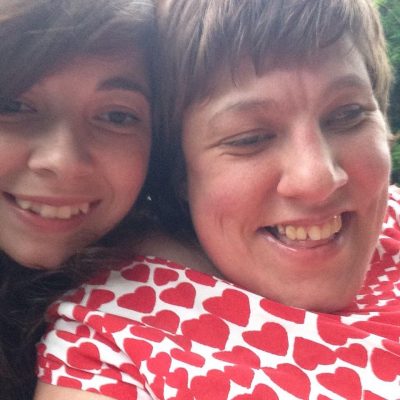
So, here I sit in the office on 6th April, thankfully alone for the moment, wearing my onesie. Yes, it’s Onesie Wednesday in “Autism Awareness Month” and, never one to miss an opportunity, I decided to get people to sponsor me to wear a onesie as I drive down the A3 and back, and all day in the office. The sponsorship money is going to our Churches Inc. programme, which provides training for churches in how they can enable autistic and disabled people to belong fully and play their God-intended part in the life of the Church.
(The picture shows two of Ros’s daughters sharing a sisterly moment).
Does this mean that Through the Roof supports Autism Awareness Month? Not really. Primarily it means I’m an unashamed opportunist when it comes to raising funds for Through the Roof. Perhaps you’re already aware of it, or perhaps not, but there’s a lot of controversy surrounding Autism Awareness Month.
For one thing, autistic people have had enough of being stereotyped, pigeonholed, marginalised and patronised. Having lived with my autistic daughter for 32 years, I know that the stereotypes are very wide of the mark, and I understand the frustration of people being typecast in this way. My daughter is one of the most empathetic, caring people I have ever met. She isn’t especially virtuous. She doesn’t fit any of the stereotypes. For another thing, putting the spotlight for a month on people who naturally shy away from it may border on abuse. And what autistic people are telling us they want is not “awareness” but acceptance and affirmation (the same as we all want); certainly not strategies and “treatments” that focus on changing them, but societal adjustments that enable them to bring their personalities and strengths to bear on the communities in which they find themselves, so that all of us can benefit from the part they play in our lives.
After all, Jesus never gave anyone the message “you’re not acceptable the way you are”, but welcomed everyone exactly as God made them. Autistic people, as I keep being reminded by another of my daughters, do not have a “problem with communication”. They communicate very competently in a “language” that most of us have not bothered to try and learn. It’s we who have the problem in understanding. Ann Memmott makes a strong case that Jesus may have had an autistic disciple, as described in John’s Gospel: follow this link to read Ann's article.
Through the Roof is not political in any way, whether with a capital P or a small p and we shy away from getting involved in controversies, so I don’t intend to comment any further on the different views about Autism Awareness Month, or the approaches that different charities and organisations have towards it – if that interests you, there is plenty of material on the Internet which you can easily find, to read more about it. What I do want to do is to celebrate the presence of autistic people in the Body of Christ, and encourage churches to give them the opportunity to share the gifts God has given them for the benefit of all in His Church, just as we would all want to be given that opportunity. “For there is no distinction…. the same Lord is Lord of all and richly blesses all who call on him.” (Romans 10.12)
Autistic people shouldn’t be seen as a problem for the church, but can enrich church life. There’s no reason for autistic children who make noises during services to be “shushed”. It’s we, as the church that need to adjust, not our children. We are family. Children make noises in families and we need to get used to it. If we cause someone such a degree of sensory overload that they cannot help but react, it’s our job as the church to reduce the sensory stimuli in the environment (or provide a low-stimulation zone where they can go when they need to escape for a while) so that being a part of the church brings them joy and not pain. Autistic people are not a burden or a difficulty to the church. It’s time we stopped thinking about autism in negative terms. Most autistic people don’t see it as a disability or a disorder, but simply a neurological feature of some people’s personal make-up. Yes, it is a spectrum, ranging from highly skilled and talented people to people (like my daughter) with quite complex learning disabilities. Pretty much like everyone else in society – a range of talents, abilities, strengths and weaknesses.
But above all else, every autistic person, is, like you or me, a unique individual, created by God with unique characteristics, gifts and traits. God created each one, as He created you and me, because they were an essential component of the universe He wished to make. God’s perfect design for His amazing universe would be incomplete and imperfect without my daughter. Without her presence, it would not match the flawless ideal God had in mind. Jesus died to redeem each autistic person, as He did for you and me, because His Church would be incomplete without them. Each one needs to hear the Gospel, because God is not willing that any should perish but that all should come to repentance (2 Peter 3.9). If that means we have to make our churches more amenable places, or be more creative about the ways in which we present the eternal truths of the Gospel to make them more accessible to our autistic brothers and sisters, then we owe it to them, to ourselves and to God to make those adjustments.
You Belong Here (Ros' Blog)
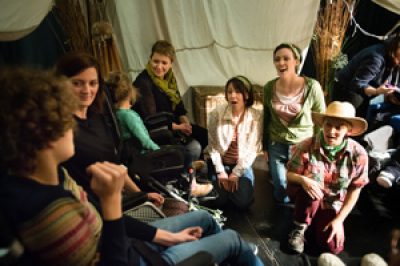
This week’s guest blog post is written by Natasha Bunney. Natasha is a final year student at De Montfort University in Leicester, reading Education with French, and writing her dissertation on attitudes to disability in the classroom. She has worked and volunteered with disabled people for 10 years and has a sister with complex multiple disabilities.
-----
Last week I was invited to observe a theatre performance of the multi-sensory show Meadow Land by Bamboozle Theatre. Bamboozle is a company that puts on performances based on the principles of drama therapy and intensive interaction for children who are typically either autistic or labelled as having PMLD (profound and multiple learning disabilities). They work in schools as well as theatres to put on immersive performances for around 5 children at a time - the reason for this low number is so that they can get to know each child and involve them in the performance.
Before the show, performers meet and introduce themselves to every child, a relationship that continues to be built on throughout the performance. The show’s opening song welcomes all the children by name, and sets the context for both its narrative and ethos. Its lyrics explain that the children are welcome to participate however they would like, including doing nothing - a message that they are acceptable as they are, and their response to the show is valid no matter what. The show continues with each child being given the opportunity for one-to-one interaction with the various animal props and sensory experiences, but my favourite part of the show was its closing song.
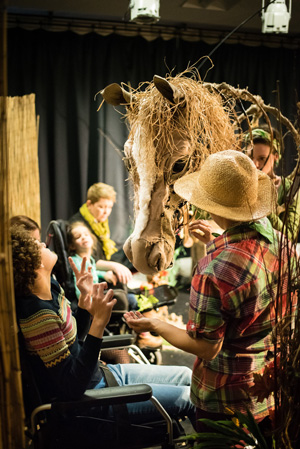
The story goes that in the meadow it is beginning to rain, so all the children and performers have to go inside a tent. Once the tent has been put up around them, the performers sing a song called 'You Belong Here', in which they again name every child and tell them that they, both individually and collectively, belong there. What an empowering statement for a group of people who are often marginalised because of their differences.
I wonder if we as individuals and churches could learn something from Bamboozle. After all, God knows each person by name and cares about them deeply - why shouldn’t we? If the gospel, and church, are for everyone, what stops us from saying with our words and actions, “you belong here”? How can we value each person’s interaction with church and expression of their faith, regardless of whether it fits our expectations? And how can we see the possibility, rather than the disability, in our churches and communities?
(Pictures reproduced with kind permission from Bamboozle Theatre Company. Photographed by Martin Neeves Photography Ltd).
Bible Reading with Dyslexia (Ros' Blog)

This week’s blog post is taken from one submitted by Aurora Betony, a dyslexic adult who was identified with dyslexia in mid adulthood. Since then, she has been looking for ways to self-help individually and as part of a community of dyslexic people. She writes about her difficulties in reading a standard Bible because of dyslexia, and the solutions she has found to overcome the difficulties. It is a timely post, because Biblica Europe is currently developing an Accessible Bible for people with varied conditions such as dyslexia, learning disability and visual impairment.
Aurora describes how her condition affects her when she reads:
Taking in what I read
When I read the Bible, often a curious thing happens: I read the words but they don’t ‘go in’. For example, if I were to read a Bible passage in church, I might read it fluently, with expression. You might have the impression that I was following every word. But afterwards, if you asked me what it was about, I might not be able to tell you. In fact, I might not be able to tell you a single thing about it. The problem is, I struggle to read the words and think about their meaning at the same time. Why? Because I’m dyslexic. If you have dyslexia, your brain has to work harder to decode words than non-dyslexic brains do. The task of decoding words greatly occupies my brain, leaving little room for ‘taking in’, or processing, their meaning.
Remembering what I read
Another aspect of dyslexia is a difficulty with short-term memory. In the context of reading, this makes it all the more difficult to ‘take in’, or follow, something I read. I often struggle to assimilate the content of what I read because it’s too much for my short-term memory. That can apply at the level of a Bible passage but also over the course of an entire book. For example, by the time I reach the end of a chapter, I’ve often forgotten what happened at the beginning of it. Some chapters are trickier than others in this respect. Abstract concepts or facts and figures are very difficult for me to take in. But stories about people that include emotion are usually accessible.
Aurora has used a two-pronged approach – finding ways to overcome the difficulties, and finding ways to capitalise on her strengths (such as listening as well as reading). She explains a variety of techniques:
To solve the problem of unfamiliar words, I engage with the Bible through contemporary language using online resources and modern translations.
To help me ‘take in’ and remember Bible content, I use strategies and I recreate Bible content. Here are some examples.
Exposing myself to the same story or passage from the Bible many times through different media, such as film, illustration, musical settings
To self-help with everything I find difficult, I use an approach that is:
I’m certain Aurora’s tips will be of help to other dyslexic people – and anyone else – who would like to be able to explore the Bible more. Biblica has produced a video about its forthcoming Accessible Bible, which you can watch by following this link.
Bible reading is not simply an end in itself, but as Pete Winmill reminds us in the video, we know that Jesus is at the heart of the Bible, and we want to know more about Him. As we read it, it has a profound effect, bringing not merely information but transformation. As Charles Spurgeon once said, “The Bible is always a new book. There is not a stale page in the Word of God. It is just as fresh as though the ink were not yet dry.”
Aurora Betony has written a comprehensive article on what helps her engage with the Bible. It can be found by following this link.
An Introduction to Through the Roof
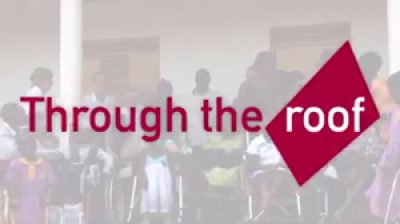
Find out all about Through the Roof in our new video, 'An Introduction to Through the Roof'. This video, which talks about all our different programmes and features short interviews with supporters and volunteers, has been produced through the hard work of 3 Strands Media. We hope you enjoy it - please share it around anyone you think might benefit from knowing more about TTR!
See the Possibility : Our New Video

Through the Roof would like to encourage you all to 'See the Possibility, Not the Disability', with our new video (produced with 3 Strands Media). Have a look below and let us know what you think...
Through the Roof: See the Possibility from 3 Strands Media on Vimeo.
The Name that is a Place (Ros' Blog)

I have just returned from a ministry trip to India. It was an enjoyable but moving trip, staying in a home for girls rescued from trafficking, and having lots of opportunities to speak both within a church and to other groups in the city. Perhaps the highlight of the trip was being given the privilege of speaking to a group of Indian and Swedish businesswomen about why we should honour and value people whose learning disabilities are so profound that they will never be able to work or make an economic contribution to society, what we can learn from them and why we should not overlook the other kinds of contributions they make to our communities. I could tell it was an eye-opener for some of the people present; one lady said I had made her see something she had never thought about before, and asked if I would come and speak to them again if I come back to India in future.
But for me the overall impression which I bring back from my trip is of how easy I found it to connect with God while I was there. It felt like what the old Christian mystics would have called a “thin” place – somewhere where the veil between heaven and earth seems so diaphanous, you feel as if you can reach through it and touch God. For sure it was partly to do with the atmosphere in the girls’ home – the continual laughter, dance and song seem to belie the trauma of the girls’ past life, and speak of a God who truly heals. But I think it came most of all from the absence of distractions.
At home I have a radio beside the bed, and I wake up and flick the switch to hear the news. I sometimes work late, sitting up in bed, and go to sleep with my laptop beside me so it’s there for me to check my emails when I wake up. If I get in, tired, from work, I can flop in front of the TV while I summon the energy to prepare dinner. In India I had no bedside radio, and my phone stopped working on the second day, so I couldn’t call or text anyone or check emails on my phone. The TV is not connected to any network, and is only used for the girls to watch movies on DVD or online on a Friday evening. So none of the usual distractions were present.
On my second morning, I woke up humming “How sweet the name of Jesus sounds”, and for the rest of the trip I couldn’t get it out of my head. I fell asleep each night with it running through my mind, I woke up humming it every morning, and on the days when I was alone at home preparing for meetings while the girls were out at their morning lessons, I let rip with all 6 verses, as there was no one there to hear me! It’s my most abiding memory of the trip, meditating more and more deeply on the words of that hymn as the days went on. I know that in the hymn books of my childhood the fourth verse begins, “Jesus, my Shepherd, Brother, Friend” but I once read that John Newton originally wrote, “Jesus, my Shepherd, Husband, Friend” and the compilers of our hymn books baulked at such intimate language being used to describe the relationship with Jesus. But as a woman who no longer has an earthly husband, I find strength and comfort in the thought of Jesus filling that role.
I recalled the Scripture that says, “The name of the Lord is a strong tower; the righteous run into it and are safe”, and I came to realise that the name of Jesus is not merely a proper noun of 5 letters or a phrase we attach to our prayers, it is a place. And in that place we encounter our Shepherd, our Husband, our Friend, the Rock on which we build, our Shield and our Hiding Place and all the other wonderful pictures which that hymn paints.
And the really joyous thing about this is that this place which is the Name of Jesus is accessible to all of us. No wheelchair ramp is needed to get inside; no sensory impairment is a disability (in fact by reducing the distractions around it may even make entering that place easier for some people); no intellectual impairment is a disqualification, since this is a place where deep calls to deep in the realm of the Spirit, and intelligence plays no part.
So I have decided to be much more intentional about ridding myself of the distractions that keep me out of this place. I am not switching on my radio when I wake up. I am banning my laptop from the bedroom so I’m not tempted to check emails as soon as I wake up. I’m switching the TV on when there’s something worth watching, but not just as a matter of habit or boredom. I’m driving around without the radio on, and finding God in the silence. This morning, when a traffic hold-up doubled my journey time into work, it wasn’t an irksome commute, it was an extended worship time.
I’m looking forward to making a third visit to the girls’ home in India some time next year, but in the meantime, I want to do all I can to make sure that I hold on to what I discovered of God while I was there, and not allow the distractions of our western lifestyle to draw me out of the place that is His Name.
